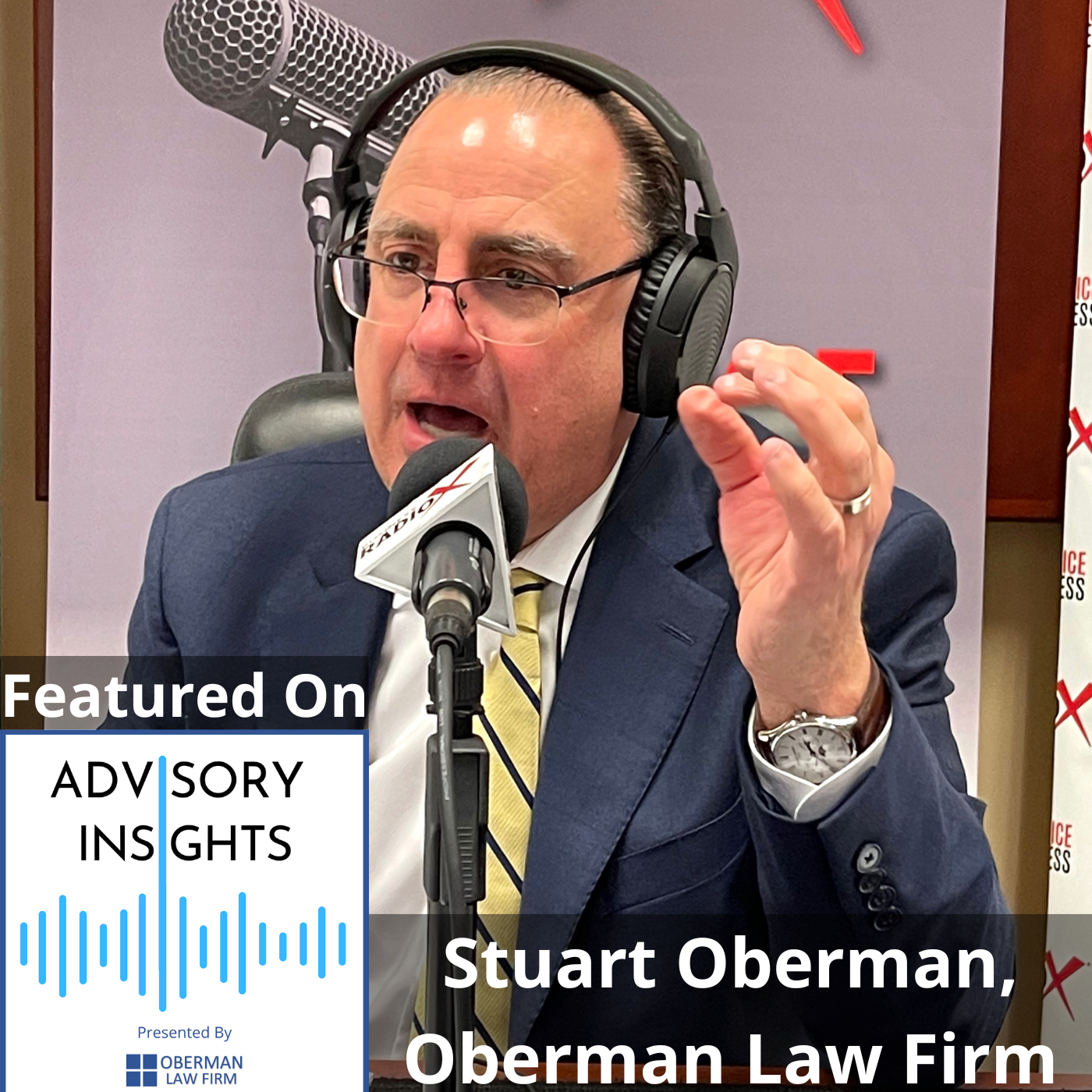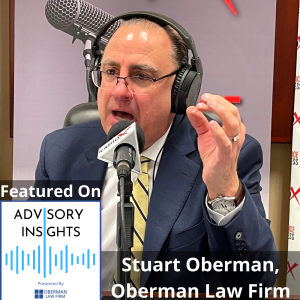
Employer Privacy Laws and What You Need to Know in 2023 (Advisory Insights Podcast, Episode 28)
On this episode of Advisory Insights, Stuart Oberman of Oberman Law Firm discussed how new employer privacy laws in New York and California are restricting the use of artificial intelligence and personal data. Stuart advises companies who are using this technology to hire a law firm with experience in this area to help them navigate the new laws and trends.
Advisory Insights is presented by Oberman Law Firm and produced by the North Fulton studio of Business RadioX®. The series can be found on all the major podcast apps. You can find the complete show archive here.
TRANSCRIPT
Intro: [00:00:01] Broadcasting from the studios of Business RadioX, it’s time for Advisory Insights. Brought to you by Oberman Law Firm, serving clients nationwide with tailored service and exceptional results. Now, here’s your host.
Stuart Oberman: [00:00:20] Hello everyone, and welcome to Advisory Insights Podcast. Stuart Oberman here, your host. Well, I want to talk about as we go quickly in 2023, we’ve got two states that are really on the forefront of a lot of issues. And I want to talk about our topic for today, employer privacy laws, what you need to know in 2023.
Stuart Oberman: [00:00:45] So, there’s been a big, big push on two ends of the world, New York and California. And we’re seeing a lot of activity between those two states. But I want to cover just a couple of things as employers and as employees.
Stuart Oberman: [00:00:59] So, as an employer, you have to know what’s going on in those two states, because, I always say, what starts west goes east, what starts up north goes south. So, I want to take a look at, really, what things are going on in those two states. So, we’ve seen a lot of activity of new legislation being enacted, which extends to employers with applicants or workers who reside in New York City or California. So, those are wide ranging areas.
Stuart Oberman: [00:01:36] So, example, the new laws in New York and California regulate the use of artificial intelligence. It has gotten to that yet. For once I think the law has sort of caught up to technology. And, also, they restrict the personal data that goes into effect January 1, 2023.
Stuart Oberman: [00:02:00] So, what does that mean? Artificial intelligence, that means you’ve got to be extremely careful – in plain English – what data you synthesize into your usage, and that includes personal data too. So, example, I want to go a little bit deeper into New York. So, in New York, Local Law 144 – again, I don’t want to get too deep, but I just want to mention this – regulates how companies can use automated employment decision tools.
Stuart Oberman: [00:02:35] Welcome to software, welcome to artificial intelligence, which, essentially, regulates bias audits on the basis of the data that is accumulated by the employer. Folks, that’s deep stuff. That is deep stuff. So then, you got to figure out, one, what data do you receive. Two, what’s personal data, how do you get it. Three, what do you consider artificial intelligence.
Stuart Oberman: [00:03:06] Again, I think the law stepped a little bit ahead of technology without really defining what that is. Because artificial intelligence from the employment standpoint is extremely, extremely new, if you will.
Stuart Oberman: [00:03:20] So, I want to jump into the California legislation. Again, you know, California has some complex laws that are very, very restrictive to California. But what we see is, if you take a look at California and New York, a lot of the laws that are implemented have a piece of that pie from New York or California.
Stuart Oberman: [00:03:44] So, I want to take a look at California’s Consumer Privacy Act of 2018 as it was and has been amended by the California Property Privacy Rights Act, which expands the data privacy laws to cover employees and applicants, also independent contractors and operations between businesses. Folks, let me repeat that. It expands into data privacy laws that cover employees, job applicants, independent contractors, and operations between businesses.
Stuart Oberman: [00:04:32] Now, there are a million things to look at, but, again, I want to keep it very, very simple. So, what we have is we have companies that are using this particular industry knowledge. But each employer has to figure out best practices, especially if you are a national company and you have workers in California, you have workers in New York.
Stuart Oberman: [00:05:01] How do you use the company information where you have data maps to figure out information? Or how do you use it to figure out what’s used, what’s shared? How do you figure out how to handle requests from someone in-house or third party regarding your data that you’ve accumulated? What are your fulfillment obligations and requests as far as human resources go, as far as legal departments go? What are your policies and procedures on that? Do you understand how much data you accumulate? What do you do with it? How do you distribute it? Again, and a question I have, does anyone really know what a bias audit is? How do you define what a bias audit is, which is the basis for these regulatory matters?
Stuart Oberman: [00:05:56] So, here’s what I would do. If you have this technology and you’re utilizing this technology – now, I’m not talking about going on to Google and loading information. This is very specific information – I would strongly recommend, strongly recommend, that companies hire a law firm with explicit, explicit experience in this area. Work together, what tools you’re using, what tools are identified, what data you’re accumulating, what data you’re giving out, what laws are taking effect, how they affect data users to privacy, and what’s the trend, you’ve got to be ahead of the trend.
Stuart Oberman: [00:06:39] So, if something starts in California and New York, you’ve got to be ahead of that. You’ve got to look at what’s coming, because, again, what starts west goes east, what starts north goes south. So, again, look at what you’re collecting. Make decisions on your automated employment practices. Folks, this is an ongoing area. Again, I think the law is a little bit ahead of the data on how to utilize this. So, that’ll just give us one more topic to talk about as we move into 2023 and beyond, I will assure you.
Stuart Oberman: [00:07:16] Folks, thanks for joining us. Advisory Insights, Stuart Oberman here. If you have any questions, please feel free to give us a call, 770-886-2400, or email, stuart, S-T-U-A-R-T, @obermanlaw.com. Folks, have a fantastic day and thanks for joining us.
Outro: [00:07:37] Thank you for joining us on Advisory Insights. This show is brought to you by Oberman Law Firm, a business-centric law firm representing local, regional, and national clients in a wide range of practice areas, including healthcare, mergers and acquisitions, corporate transactions and regulatory compliance.
About Advisory Insights Podcast
Presented by Oberman Law Firm, Advisory Insights Podcast covers legal, business, HR, and other topics of vital concern to healthcare practices and other business owners. This show series can be found here as well as on all the major podcast apps.
Stuart Oberman, Oberman Law Firm

Stuart Oberman is the founder and President of Oberman Law Firm. Mr. Oberman graduated from Urbana University and received his law degree from John Marshall Law School. Mr. Oberman has been practicing law for over 25 years, and before going into private practice, Mr. Oberman was in-house counsel for a Fortune 500 Company. Mr. Oberman is widely regarded as the go-to attorney in the area of Dental Law, which includes DSO formation, corporate business structures, mergers and acquisitions, regulatory compliance, advertising regulations, HIPAA, Compliance, and employment law regulations that affect dental practices.
In addition, Mr. Oberman’s expertise in the healthcare industry includes advising clients in the complex regulatory landscape as it relates to telehealth and telemedicine, including compliance of corporate structures, third-party reimbursement, contract negotiations, technology, health care fraud, and abuse law (Anti-Kickback Statute and the State Law), professional liability risk management, federal and state regulations.
As the long-term care industry evolves, Mr. Oberman has the knowledge and experience to guide clients in the long-term care sector with respect to corporate and regulatory matters, assisted living facilities, continuing care retirement communities (CCRCs). In addition, Mr. Oberman’s practice also focuses on health care facility acquisitions and other changes of ownership, as well as related licensure and Medicare/Medicaid certification matters, CCRC registrations, long-term care/skilled nursing facility management, operating agreements, assisted living licensure matters, and health care joint ventures.
In addition to his expertise in the health care industry, Mr. Oberman has a nationwide practice that focuses on all facets of contractual disputes, including corporate governance, fiduciary duty, trade secrets, unfair competition, covenants not to compete, trademark and copyright infringement, fraud, and deceptive trade practices, and other business-related matters. Mr. Oberman also represents clients throughout the United States in a wide range of practice areas, including mergers & acquisitions, partnership agreements, commercial real estate, entity formation, employment law, commercial leasing, intellectual property, and HIPAA/OSHA compliance.
Mr. Oberman is a national lecturer and has published articles in the U.S. and Canada.
Oberman Law Firm
Oberman Law Firm has a long history of civic service, noted national, regional, and local clients, and stands among the Southeast’s eminent and fast-growing full-service law firms. Oberman Law Firm’s areas of practice include Business Planning, Commercial & Technology Transactions, Corporate, Employment & Labor, Estate Planning, Health Care, Intellectual Property, Litigation, Privacy & Data Security, and Real Estate.
By meeting their client’s goals and becoming a trusted partner and advocate for our clients, their attorneys are recognized as legal go-getters who provide value-added service. Their attorneys understand that in a rapidly changing legal market, clients have new expectations, constantly evolving choices, and operate in an environment of heightened reputational and commercial risk.
Oberman Law Firm’s strength is its ability to solve complex legal problems by collaborating across borders and practice areas.
Connect with Oberman Law Firm:
Company website | LinkedIn | Twitter
















